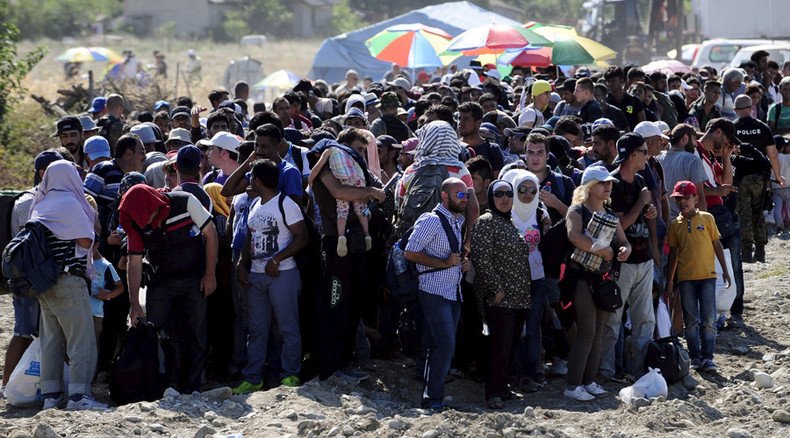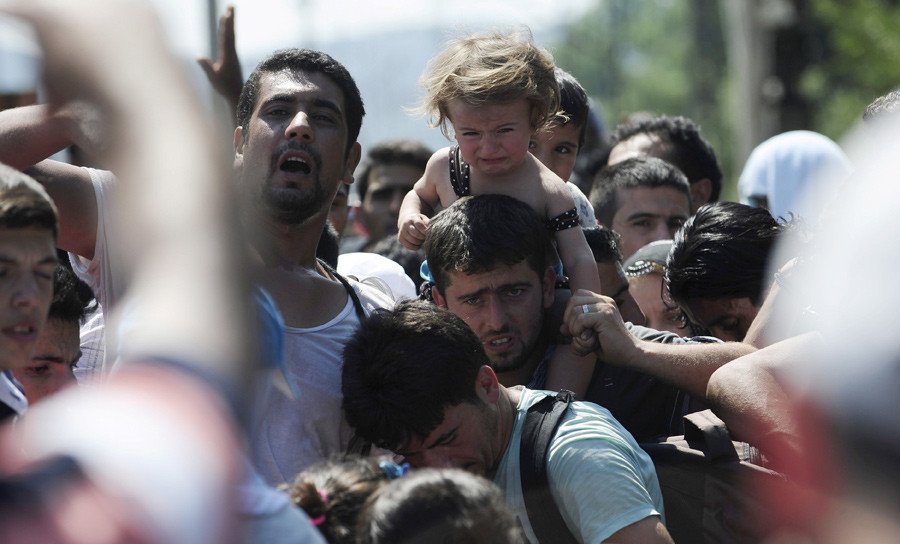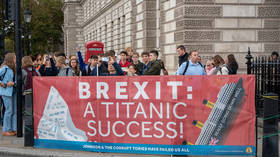Mass migration: Destroyer of empires and super powers

There is much the ancient world can still teach us, and one of the key lessons today is that mass migration - motivated by war, societal collapse, and poverty - is capable of destroying even the mightiest of empires.
At the height of its power, the Roman Empire was so vast and omnipotent that it was run on the basis of the dictum: "Roma locuta est. Causa finita est" (Rome has spoken. The cause has finished).
The names of its most powerful figures are as familiar to us as our own – Pompey, Caesar, Augustus, Nero, Hadrian, Vespasian, Constantine – men whose rule over the ancient world was so dominant that the only threat they faced came from within Rome itself.
READ MORE: One way ticket? Macedonia lets thousands of migrants through to EU amid bloc's crisis
Indeed, it would have been the very definition of insanity to claim that an empire stretching from the Italian peninsula all the way across Western Europe and down into North Africa and the Middle East, enforced by legions whose very presence in the field of battle induced terror in any army unwise enough to challenge its writ, was anything other than invincible and eternal.
Yet in the year 476 AD what was then known as the Western Roman Empire came to an abrupt end after a century of successive barbarian invasions finally succeeded in bringing Rome to its knees. The symbols of its power - in the form of the emperor’s imperial vestments, diadem, and purple cloak - were sent to Constantinople, the seat of power of the eastern half of the empire. Thus the curtain was closed on Rome’s glorious 1000-year history. It was proof that no empire, regardless of its economic and military power, lasts forever.
In truth, Rome’s demise had been a long time coming; the contradictions of an empire run on the basis of slavery, tribute, and plunder were so great it was inevitable they would become insurmountable in time. Under Rome’s rule millions lived in poverty and squalor, supporting elite whose wealth and ostentation was obscene and increasingly untenable.
Any economic system that operates on the basis of coercion, domination, and super exploitation gives rise to resistance. This in turn leads to more force, more military power, having to be deployed to maintain the status quo. However this can only succeed in fomenting further resistance and with it destabilization, which in turn acts as a catalyst for the mass movement of people seeking sanctuary from the chaos that results.

This, in sum, is what brought down the Roman Empire. Moreover, it is a process the early stages of which are evident today with a growing migration crisis that is starting to chip away at the foundation of Western hegemony.
Both in Europe and the United States the issue of immigration and migration has already succeeded in producing a sense of panic within governments and the political classes, to the point where political formations, parties, and movements have come to the fore in direct response to it.
In the US the billionaire real estate mogul, Donald Trump, is riding high in the polls as the most likely to win the Republican nomination for the US presidential elections next year. He has vowed to build a wall “greater than the Chinese Wall” along the US-Mexico border if elected president, citing ‘illegal immigration’ as the most important issue facing the United States today.
You would think that the gross generalizations of migrants from south of the border he has employed so liberally – describing them as rapists, criminals, murderers, etc. – would be so unpalatable and objectionable that he would have seen his chances of winning the nomination ended long before now. On the contrary, with every speech and interview Trump is streaking further ahead of the other candidates to such an extent it has left commentators and political pundits scratching their heads in disbelief.
In Europe, meanwhile, migration from Africa and the Middle East has likewise resulted in an increasingly irrational and militant response on the part of the political mainstream. Britain has just announced an agreement with France over the issue of migrants at Calais, who are stuck in makeshift camps in a state of limbo from where they regularly attempt to cross the Channel in the back of trucks or even, in one case, almost reaching the other side of the Channel Tunnel on foot.
Their desperation to reach Europe is no surprise given the chaos they have left behind. Syria, Libya, Eritrea, Somalia, Afghanistan, Iraq - with each year that passes more countries in Africa and the Middle East fall prey to chaos, carnage, and destabilization.
The people fleeing these conditions are victims of a global economy that itself is in crisis, exposing the incontrovertible fact that the development and huge wealth of the northern hemisphere is based on the under-development and crippling poverty of the southern hemisphere. All of the conflict and seemingly unconnected crises we are living through is connected to this one indisputable fact.
Unsurprisingly, the political classes sitting at the apex of this unsustainable reality are in denial, refusing to countenance for a moment their role as authors and architects of a world that creeps every closer to the abyss. It is a congenital disorder they share with their Roman antecedents. Like them they are increasingly attached to the deployment of force and hard power to deal with the symptoms of the gross inequality and inequity that underpins the global economic and political system. In so doing they continue to deepen rather than alleviate the problem.
As the Roman philosopher, Seneca, reminds us: “For greed all nature is too little.”
Donald Trump is no Seneca. He is, instead, a monster created by an apparatus of greed and rampant individualism that will, if unchecked, lead inexorably to its own destruction.
The scenes of desperate humanity we are currently witnessing at the Channel port of Calais and in Macedonia are the product of a world underpinned by greed and the philosophy that says “might is right.” It cannot last on this basis. What is more, it doesn’t deserve to.
The statements, views and opinions expressed in this column are solely those of the author and do not necessarily represent those of RT.
LISTEN MORE:
The statements, views and opinions expressed in this column are solely those of the author and do not necessarily represent those of RT.













